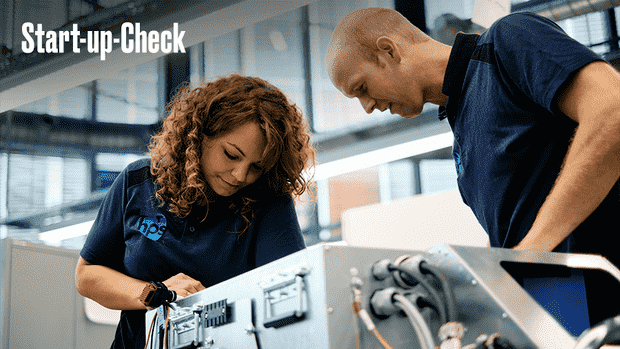Dusseldorf Energy self-sufficiency has been a wish of many homeowners since the outbreak of the energy crisis at the latest. The Berlin start-up Home Power Solutions (HPS) has developed a year-round storage system for solar power that is intended to guarantee an absolutely CO2-free energy supply. Hydrogen is the key.
A photovoltaic system on the roof generates solar power. It is either used directly, stored or converted into green hydrogen in an electrolysis process. Electrolysis uses electricity to split water into its components, hydrogen and oxygen. If the electricity comes from renewable sources, it is considered “green”.
A complete system costs between 85,000 and 120,000 euros and is subsidized by the “Federal Funding for Efficient Buildings” (BEG).
(Photo: Home Power Solutions)
In hydrogen storage, the green energy is then available all year round for power generation. With the help of oxygen, it is converted back into electricity. The resulting waste heat can also be used for hot water treatment or heating.
What does a facility cost?
A system costs between 85,000 and 120,000 euros. The sales tax on electricity storage for private buildings, which has been omitted since January 1st, 2023, is already priced in. The electricity storage is subsidized in existing buildings via the “Federal Funding for Efficient Buildings” (BEG). The subsidy for fuel cell systems operated with green hydrogen is 25 percent. According to HPS, a subsidy of up to EUR 15,000 is possible in a single-family home, and up to EUR 27,500 in an apartment building and in commercial real estate.
The BEG funding can usually be combined with regional funding programs. The delivery time is currently around twelve months.
Who is behind this?
Zeyad Abul-Ella founded the Berlin company in 2014. A year later he hired the first eight employees. In mid-2019, the team launched the first long-term electricity storage system for buildings and generated sales of EUR 400,000. In the Corona year 2020, sales rose to almost two million euros. In 2021 it almost doubled, and last year it doubled to around eight million euros. “The order books for 2023 are already full,” says Abul-Ella.
The founder explains his success with disruptions in the energy market: “When we started, we were smiled at. We had a vision that was too risky for large corporations,” he says. But: “We were lucky. Things have happened since 2014 that have inspired us.”
The accelerating turnaround in mobility, the increasing demand for heat pumps and the increasing environmental awareness in society as well as the search of large energy companies for new business models in the field of sustainability and the energy crisis in the past year have changed the mood. “The timing was perfect. If we had started building HPS five years later, other companies would have been technology and market leaders.”said Abul-Ella.
So far, the company has been selling the systems exclusively within Germany, but requests are coming from all over the world, says Abul-Ella. However, he intends to expand: a pilot plant was recently installed in Switzerland. Further systems in the DACH region are to follow. HPS currently employs 250 people, most of whom work in Berlin.
The memory bears the Latin name “Picea”, in German “spruce”. “Because like the spruce, Picea stores the sun and contributes to the reduction of CO2,” says Abul-Ella. Bank Santander has supported HPS with a loan, and a number of private investors are also involved in the company.
That says the hydrogen expert
HPS is one of the few providers in Europe that offers electrolysers for single-family homes and small residential areas, says Jürgen Peterseim, hydrogen expert at the auditing company PwC. He is skeptical: A lot of energy is lost when converting electricity into hydrogen. The efficiency, i.e. the ratio of the energy used to the energy that can be used, of a solar system in combination with an electrolyser is around 60 percent. Even significantly lower when converted back into electricity.
“Storing electricity in a battery is many times more efficient,” he says, since the losses are less than five percent. The combination of a solar system with a battery and heat pump is therefore a much more energy-efficient solution. If the stored energy is not sufficient for the winter, it is even cheaper, given average energy prices, to obtain electricity from the public grid instead of from the small power station in the basement, also because of the high investment and maintenance costs for the electrolyser and storage tank.
Rather, he believes in the success of start-ups in rural areas or in medium-sized companies. There, the possible areas for solar systems are larger, and higher grid and electricity costs offer a financial incentive for decentralized hydrogen systems, he says.
More: How Efficient Energy cools data centers and factories in a more environmentally friendly way
